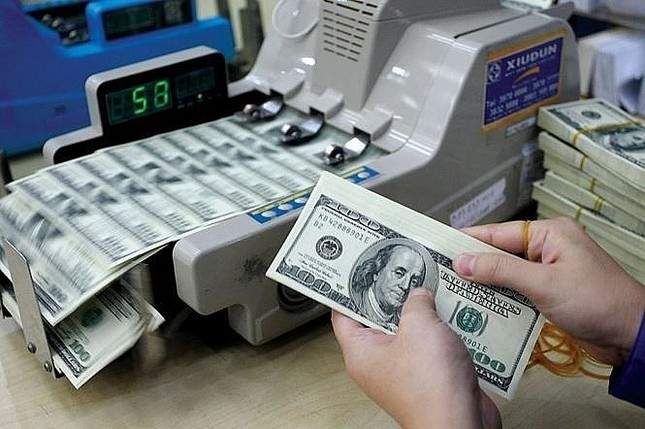On March 5th, the USD exchange rate continued to increase compared to yesterday. In particular, on the free market, the USD price set a new record at 25,700 dong/USD.
The State Bank published the central exchange rate of the Vietnamese dong to the US dollar at 24,012 VND/USD (an increase of 8 dong compared to yesterday). The reference exchange rate at the State Bank Trading Department is currently buying at 23,400 VND/USD (unchanged) and selling at 25,162 VND/USD (an increase of 8 dong).
The USD exchange rate increased slightly today at most banks. Vietcombank increased both buying and selling rates by 10 dong to 24,480 – 24,850 VND/USD. VPBank decreased both buying and selling rates by 17 dong to 24,478 – 24,838 VND/USD. Asia Commercial Bank decreased both buying and selling rates by 10 dong to 24,490 – 24,840 VND/USD. MB Bank increased both buying and selling rates by 5 dong to 24,505 – 24,995 VND/USD. Techcombank increased the buying rate by 5 dong and the selling rate by 7 dong to 24,513 – 24,845 VND/USD. Seabank increased both buying and selling rates by 25 dong to 24,510 – 24,940 VND/USD.
The most popular buying price is currently 25,550 dong, an increase of about 50 dong compared to yesterday. The selling price at many unofficial trading points has reached 25,700 dong, an increase of about 100 dong compared to yesterday. Previously, on March 4th, the free USD price also increased by 100-150 dong. Therefore, from the beginning of the year to now, the free USD price has increased by about 900 dong.

The USD price on the free market reached 25,700 dong, the highest ever.
In an exchange with PV Tien Phong, Ms. Le Thi Huong Tra – Researcher at the Banking Research Institute, Banking Academy – said that the above price level is the highest price range of USD on the free market ever.
According to Ms. Tra, the first reason for the increase in USD price is that the recent USD index has increased from 102-103 to 104 points. Meanwhile, the USD index in the third quarter of 2023 was only at 100.3 points.
In addition, the sharp increase in USD price may also be influenced by the gold price. According to statistics from the World Gold Council, in recent years, Vietnam has consumed about 50-60 tons of raw gold per year, more than 20 times the total amount of domestically mined gold.
“Vietnam has to spend billions of USD per year to import large amounts of gold, which also puts pressure on exchange rates. In addition, this can be a loophole for gold smuggling across borders. Therefore, managing strictly from state management agencies and functional agencies is needed to better manage both the gold and the free USD markets,” Ms. Tra said.
Recently, the Securities Analysis Department of PHS mentioned the hoarding of foreign currencies in the context of continuous USD appreciation in both the domestic and global markets.
In the evaluation of the banking industry in late February, PHS also mentioned that credit is still growing relatively slowly and expectations of improvement from the end of the first quarter of this year.
Therefore, the banking system still maintains a large surplus liquidity in the first quarter (especially after the money returns to the system after Lunar New Year), creating motivation for hoarding, according to PHS.
Mrs. Hoang Thi My Lien – Head of the Analysis Department of Phu Hung Securities (PHS) – said that the exchange rate is usually quite stable in the early period of the year thanks to remittances and strong FDI inflows. However, the context of 2024 has many differences, most notably the negative interest rate differential between USD and VND throughout the period.
In addition, businesses paying off foreign loans and repatriating profits also contribute to the situation.
However, Ms. Lien still believes that “VND is a strong currency compared to other countries in the region, with a decrease of 1.5%”. Thailand baht depreciates the most compared to the beginning of the year, down by 5%, followed by Malaysian ringgit (-3.8%), South Korean won (-3.1%). Only India has maintained an increase in price against USD (0.4%).





![[Photo Essay]: Experts, Managers, and Businesses Unite to Forge a Path Towards Sustainable Green Industry](https://xe.today/wp-content/uploads/2025/07/z678592918-150x150.jpg)


![[Photo Essay]: Experts, Managers, and Businesses Unite to Forge a Path Towards Sustainable Green Industry](https://xe.today/wp-content/uploads/2025/07/z678592918-100x70.jpg)






